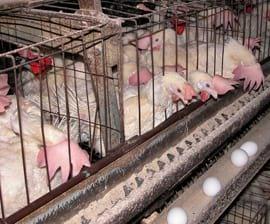Chicken Welfare Concerns
Forum: Chicken Welfare Concerns
Since consumers are becoming more and more interested in animal welfare, there is an increasing concern about how some practices can affect the welfare of chickens and the quality of the finished product due to cramped conditions. I would like to know your opinion about the alternative farming methods like enriched cages, cage-free farming, free range and organic. Look forward to hearing your experiences!!!

God created birds to live on the ground, water or to fly. Keeping birds in houses is somewhat acceptable, but to keep them in cages, that is not acceptable at all. We should think about number of birds per square meter not to be more than 4 for layers and 3 for broiler breeder and 6 for broiler. That will solve many management problems and will reduce stresses.
Cages should be cancelled and should not be used in raising any kind of chicken.
Much has been discussed about the broilers welfare. The animal rights groups have been doing a lot of noise worldwide, yet less in EU then in US, about this important matter and the battles between actvists and companies keep on happening here and there, every now and then.
I believe the matter is really simply. Upon taking on the role to demonstrate and convince poultry processors about the need to care the live birds from farm thru plant, the animal rights groups are assuming a role that should have been elected spontaneously priority number one by the poultry companies around the world!
Why so? For economical reasons, only! Well-cared birds along the fattening period use to be more less stressed, more productive, less costly to produce and are usually defect-free. Likely, well-cared birds while on the move from farm to plant, for processing, tend to be also defect-free. At the end of the line, plumpy, meaty and defect- free birds are converted in defect-free carcasses, which generate only, or mostly, Grade A whole carcass or parts. Grade A products are less costly to produce, generates zero loss and are more profitable. Is it enough to justify why the companies themselves should become the most interested party in securing the well-being of their live birds along the whole chain?

All the important contributions posted here, yet may differ from each other in some marginal aspects, focus on the relationship between broilers welfare concerns and the GROWING PROCESS' ECONOMICS.
This is, in fact, what minds! Let's see why! We must take good care of broielrs aiming at producing healthy, meaty, deffect-free and least-costly birds to be used for human consumption. The cheaper the grown birds, the cheaper the final product, the protein ultimately intended for human consumption.
By having this context in mind and by working to put it in motion, we'll be improving chicken meat competitiveness and, mostly, its affordability. By improving its affordability, chicken meat will become accessible for a greater number of people around the world, thus contributing to improve the average world diet, which will contribute to reduce the hunger and undernourishment plagues! At the end, the economics is not the target, itself, but the means to turn chicken meat out to be accessible fro as many people around the world as possible!
Dear Sir,
Here there may be different opinions from different ends. If we think from the Animal welfare end then no doubt we can say that the poultry farmers are trespassers and try to ruin the natural life of birds. But if we think from the poultry farmers end as a businessman what they are doing is well and good as per their business economics.
While peoples think to rear the birds in their natural conditions viz. free range then i don't feel the business will be vulnerable but if ruled to do so then that government has to make the fixed price policy to their final products by calculating the economics of free range poultry farming.
Regarding health & hygiene issues, as compare to free range system in confine rearing prevention & control is much easy. And also the government bodies 7 peoples who are thinking to rear the birds in free range system have to look after the land/space availability too as every year human population is growing and death rates is declining. To fulfill the demand for food of such heavy populations we have to look after concept of maximum healthy yield of food with less infrastructure & investment.
regards,
Dr Jaydip
For sure God gave Man authority over Animals and birdstoo,With or without human rights.Its just important to
make sure the birds have enough space.Eg number of birds per square meter, Layers 1 bird per 2 square meter and Broilers 1 bird per 1 square meter.
Regards Joseph Akayi.
It is worth noting that the concern about animal welfare, in general, and broilers welfare, in particular, has extrapolated the limits of the farm, as a whole, to become an international political and commercial concern, as well.
Countries aiming at exporting their products of animal origin, chicken meat, pork, beef or wahtever, must comply not only with sanitary and food safety requirements of the importing countries, but also with animal welfare legislation's requirement, as well.
This requirement is in place to secure the animals the products came from, and while in its country of origin, have been subjected to the same conditions those in the importing countries are subjetc to. This is the political side of the issue - the local society put a lot of pressure on politicians to approve local legislations that are protective to animals of its country, while want to be sure all imports comply with this same regulations. Therefore politicians are compeled to put a lot of pressure on the commercial legislators to create mechanisms to inhibit the imports of food from mistretaed animals in their country of origin. At the end politicians are applaued for their animal-conscious driven political performance and, as such, enjoy good chances to be reelected over and over!
In The Netherlands there are a lot of projects for this matter.
For some of these projects we delivered air inlets/daylight products and pop hole doors.
I will give you a little summary:
-Puur en Eerlijk AH free range broilers.. Puur en eerlijk means pure and fair.
This is actually an initiative from the supermarket chain Albert Heijn.
These chickens have also 3 % daylight and a wintergarten
you can watch a project here:
http://www.boerderij.nl/10100567/Pluimveehouderij/video-foto-pluimveehouderij/Nieuwe-scharrelvleeskuikenstal.htm
This project was shot in may 2010. It’s in Dutch but the pictures speak for themselves.
Gildehoen
This is a concept which uses less chickens per m² and a slow breed raise.
Also they try to use less medicine and there is some distraction in the barn for them like.
Like straw bales.
http://nl.forfarmers.eu/nieuws/item.php?NieuwsID=549&SectorID=103
Also in dutch
One for layers
- Rondeel
Is a special project which takes a consideration to the next items: animal welfare, food safety, environment, income for the poultry holder
http://www.rondeel.org/ Also in dutch but you can see how it works on the pictures.
there are only 2 build for the moment.
But I think these projects are only usefull if the customer wants to pay for it.
A lot of people don’t know where there meat or eggs come from and they just watch the price.
For the people who are aware and want to pay for it these projects are nice initiatives.
So I think a marketing strategy is also at use to promote these types of projects.
Dear Jorn Rinia,
Interesting these two projects and the questions you place.
Are consumers really aware of where the meat they eat comes from? Are non-traditional poultry producers communicating effciently with final consumers about their non-traditional methods and, thus, conving them on the benefits of their non-traditional products? Are consumers WILLING to pay more for meat non-traditionally grown protein animals?
I am in the poultry industry for a long time and do not think the non-traditionally grown chicken are better FOR ME than the others. Therefore, why paying more for organic (a fake), green, free-range and etc.? No! Ordinary chicken, since you know the company behind it, is good, nourishing and healthy!












.jpg&w=3840&q=75)


.jpg&w=3840&q=75)












